Welcome to my digital nomad guide to living in Hoi An. This wonderful and historic Vietnamese city is one of my favorite places to work remotely. It offers the perfect mixture of ancient culture, modern amenities, and one of the best beaches I’ve ever visited.
Living in Hoi An as a digital nomad gave me the best work/life balance I’ve ever experienced. From solid beach WiFi to private coworking spaces, Hoi An has everything a remote worker like me desires.
About Hoi An

Located on Vietnam’s central east coast, Hoi An is a city of 120,000 people and a registered UNESCO World Heritage Site. Old Town Hoi An, with its famous Japanese Bridge, dates back to the 15th century as a trading port.
Hoi An also benefits from a beautiful coastline and is home to some of the best beaches I’ve ever seen. As such, many tourists visit Hoi An every year. One of my favorite memories from my stay is cycling through the vast rice paddies, dodging water buffalo to get to the beach.
The Night Market takes over several streets of Old Town every evening, drawing locals and tourists alike to the riverside. While boats and candle-lit lanterns fill the river after dark creating an awesome photo opportunity.
Digital Nomad in Hoi An: Personal Experience

Being a digital nomad in Hoi An was a fun experience. However, as one of Vietnam’s smaller cities, I had some concerns going in and imagined that I could face some issues as a remote worker.
My worries were all unfounded as I discovered several great dedicated coworking options for very affordable rates. And like much of Vietnam, WiFi is pretty much available everywhere; from beach sunbeds to even the smallest of cafes.
The cost of living in Hoi An is another great benefit for digital nomads. Across the board, I found things to be significantly cheaper than in many other countries I’ve visited (more on this later).
Although Hoi An isn’t exempt from Vietnam’s rainy season, it never gets too cold. I love the warm year-round climate and the temperatures definitely contributed to choosing Hoi An as a temporary home base.
Is Hoi An Safe?

Like anywhere, being aware of surroundings, taking care of belongings, and using common sense is important. But in general, Hoi An is a safe place to visit with crime stats that rank from low to very low for all varieties of incidences.
The heavy tourist traffic, especially in the Old Town lends itself to potential pickpocketers and scams, but again, cases of this are considered very low for such a popular destination. Overall I always felt safe in Hoi An.
Best Areas to Live in Hoi An
Hoi An isn’t a huge city by Vietnam standards, but it still benefits from having several different areas to consider living in. Here are a few of my top picks for digital nomads to take a look at;
1. Old Town
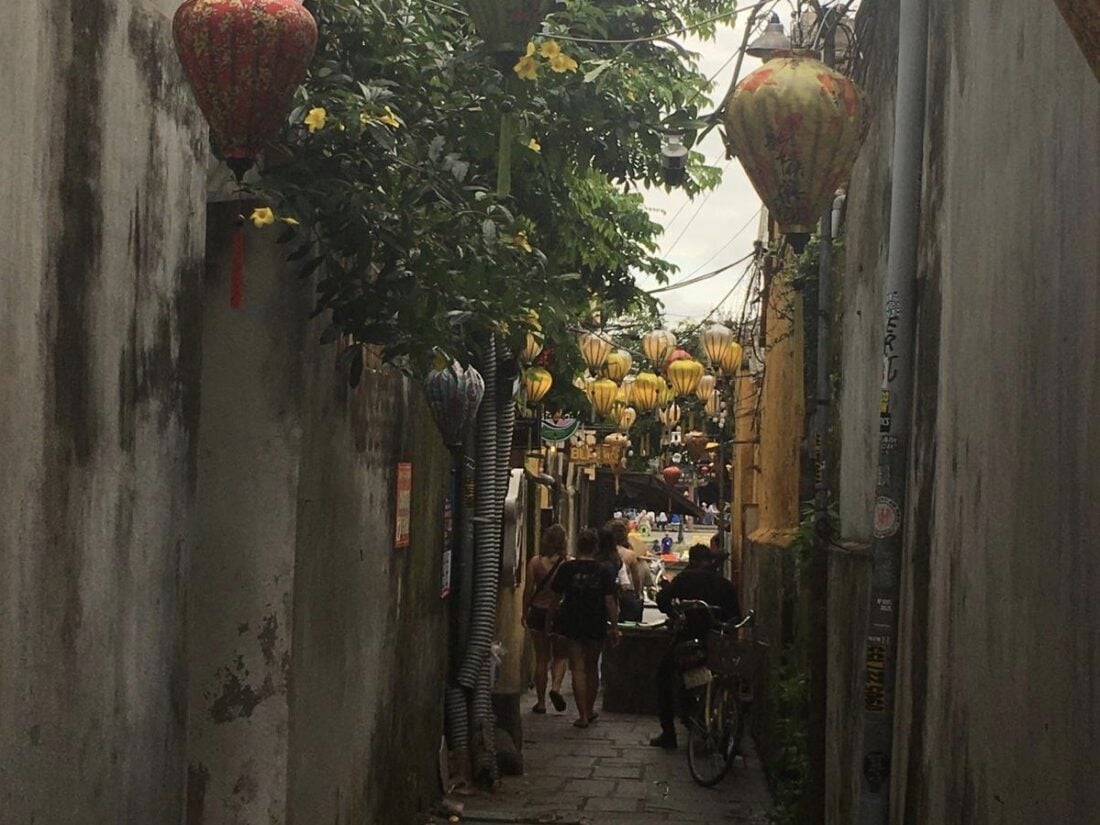
I’ve already mentioned it a few times, but Old Town is a great place to locate yourself as a digital nomad. The entire district is packed with cafes, bars, and cultural things to do outside of work during your downtime.
It’s undoubtedly the busiest and most vibrant area of the city. The ancient streets form a registered UNESCO World Heritage Site but modern amenities and everyday conveniences are all readily available. There are a couple of excellent cafes here, perfect for remote working, that I’ll be recommending further on.
2. Cam Chau

If it’s a quieter and more authentic experience you are after in Hoi An, Cam Chau is the place to stay. It’s not too far from the Old Town, a little closer to the beach, and has an array of waterways, rice paddies, and countryside that make for a more tranquil atmosphere.
The residential area still has many excellent cafes with decent WiFi to connect to, and a couple of Hoi An’s great coworking spaces are found here. Hotels and apartments are pretty ubiquitous across Hoi An, and there are many great accommodation spots to choose from in Cam Chau.
3. An Bang Beach

Who doesn’t want to live at the beach? An Bang Beach is one of the most beautiful beaches I have ever come across, with white sands, clear water, and a whole host of stuff going on. It’s a popular location, especially on weekends, but it never feels overcrowded.
The area is full of excellent cafes, bars, restaurants, and accommodation options making it an idyllic location for tourists, digital nomads, and locals alike. It feels hundreds of miles away, but the beach is only a 10-minute drive or a pleasant cycle from Old Town.
4. Tan An

Tan An is where I called home whilst living in Hoi An. With fewer hotel and accommodation options, it had the feel of living in an authentic Vietnamese neighborhood. It’s also where you’ll find Bonte, an excellent cafe and coworking space.
Many traditional street food stalls and authentic Vietnamese restaurants line Le Hong Phong Street. A short cycle through the rice paddies leads you to the beach, and it’s possible to reach Old Town on foot within 25 minutes.
5. Cham Islands

Rarely does the chance to reside on a secluded island arise, yet in Hoi An, it’s attainable. Just 9 miles (15 km) offshore lie the Cham Islands, boasting breathtaking wilderness, pristine bays, and sandy beaches, all while offering modern amenities suitable for digital nomads.
Regular taxi boats connect it with the mainland and accommodation prices are in keeping with what you would pay in Hoi An. The hiking here is fantastic too, and it’s far less crowded on busy days than An Bang, so why not base yourself on one of these islands?
How to Find Accommodation in Hoi An
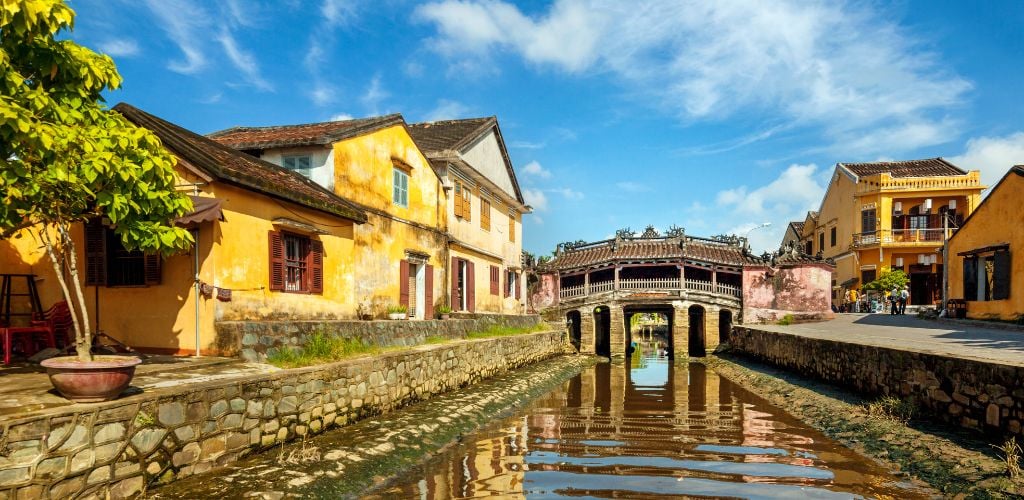
Hotels and apartments to rent are readily available in Hoi An. Here are a few recommended ways to find good deals on some great accommodation options.
1. Booking.com: Many of the hotel rooms and apartments on Booking.com can be booked without prepayment or with free cancelation which is a great option to have for free-spirited digital nomads like me. There are listings in Hoi An for all budgets and big discounts and perks for regular customers who attain Genius Level 3 membership.
2. Airbnb: Similarly, Airbnb is an excellent option when working remotely in Hoi An. Many apartments across the city can be booked easily and for great rates. There are big discounts to be had on month-long stays, It’s not out of the ordinary to see as much as a 40-50% discount.
3. Trusted Housesitters: House sitting is an increasingly popular way to travel and a great way to keep costs down. Trusted Housesitters is one of the biggest house sitting sites around and Vietnam is an emerging market looking for sitters. Be sure to also read my 8 Expert Tips for Landing a House Sitting Job.
4. Workaway: Could you afford 4-5 hours, a few days a week in your digital nomad schedule to help at an animal sanctuary or teach English? If so, Workaway might be a great option. There are hosts in Hoi An looking to exchange accommodation and meals for a little help.
Cost of Living in Hoi An

I found that Vietnam in general is a very cheap place to live compared to places like the US or the UK. But let’s break down these costs and see what a digital nomad can expect to pay while living in Hoi An.
Restaurants and Groceries

Dining out is very popular in Hoi An. There’s a huge range of street food vendors to try out, where a tasty and authentic meal can be purchased for under $1.50. A visit to a fancier establishment and a hearty 3-course meal won’t break the bank either at under $8pp.
A visit to the grocery store is a refreshing experience in Hoi An, especially if you’ve lived just north of London like me for many years. 1kg (2.2lbs) of rice at $0.70 and 1kg of chicken for under $3.50 go down nicely with a large $0.70 beer.
Vietnamese coffee can be purchased from street vendors and small cafes for as little as $0.60, but even a fancy coffee at a big chain store is only around $1.50.
Accommodation Costs

The average cost of a 1-bedroom apartment in central Hoi An is just $260/month. However, this is based on renting an apartment through a letting agent on a longer-term basis and not using sites such as Booking.com or Airbnb.
Having said that, prices for month-long stays can be secured through Airbnb for around $400/month. Sizeable discounts are often added for longer stays. If you’re happy with a room only, you can expect to find somewhere decent for $250/month.
Gas, water, electricity, and internet cost an average of $60/month for those who opt for longer-term official rentals. Be aware that some Airbnb hosts may charge for utilities on some longer stays. They usually make this clear on their listing if this is the case.
Transportation Costs in Hoi An

Hoi An is a great city to walk and cycle around. It’s not a huge place and lacks the intense and chaotic traffic of Hanoi and Ho Chi Minh City. It feels safer to be on the roads, which for the most part are flat and well-maintained.
Grab is an excellent app and Vietnam’s equivalent to Uber. Safe, reliable, and cheap taxis or mopeds can be secured and paid for in a few clicks on your phone. Short journeys always seem to cost me $1.50 and a trip to the beach from Old Town Hoi An is around $4.
SIM Cards and Data

There are several SIM options for tourists in Hoi An. Viettel, Mobiphone, and Vinaphone are the big three operators. They all have stores in the city and I’ve found that all of them are pretty adept at dealing with foreigners and getting their phones set up there and then.
The prices I’ve seen online have always differed from those I’ve seen in-store. Rather than giving out-of-date info, I offer you my average spend, which was around $5/month for a mass of data that I never managed to get through. Be aware that Viettel adds an unexpected few dollars to your bill for new SIM card purchases.
I’ve never found a SIM with international minutes despite adverts to the contrary. It’s also important to note that you’ll need a passport to hand when purchasing a new SIM card.
Money Saving Tips for Hoi An
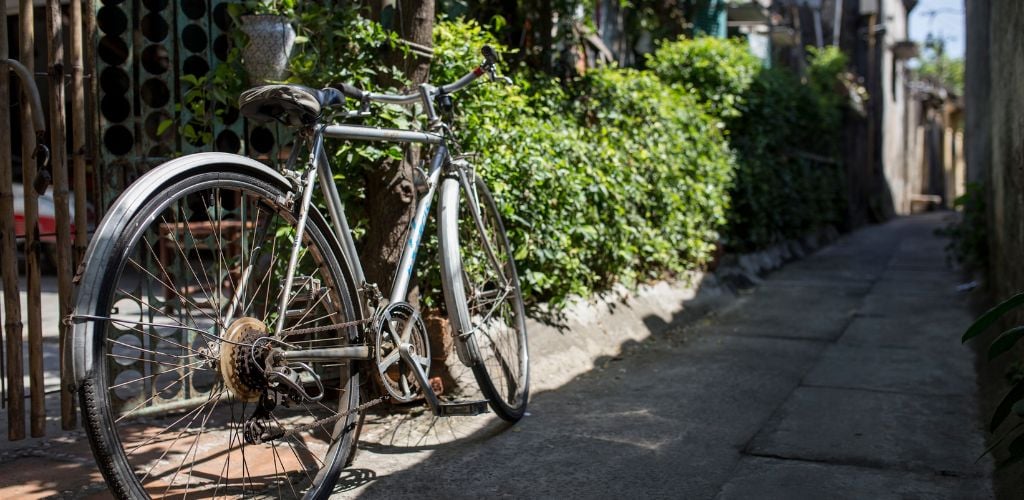
Here are a few money-saving tips for life in Hoi An;
- Eat local street food: Delicious street food meals cost under $1.50 and are available pretty much everywhere.
- Haggle at markets: It’s a Vietnamese custom to haggle; don’t be afraid to ask for lower prices.
- Cycle or walk: Hoi An is not a huge city, so walking and cycling are often good options for getting around.
- Get a Grab: Grab is a ride-sharing service widely used in Hoi An, prices are cheaper and more precise than taxis.
- Happy hours: The abundant tourist trade means many bars and restaurants do excellent daily happy hour deals.
- Discounted Airbnb: Booking an Airbnb for a month-long stay can mean discounts of up to 40-50%.
Coworking Spaces in Hoi An and WiFi Speed

Vietnam in general rarely has issues with WiFi and Hoi An is no exception. Speeds are consistently efficient and reliable connections are available in even the most obscure and unexpected of places.
A few dedicated coworking spaces are also available for digital nomads to use. I put these to good use while living in Hoi An, here’s a breakdown of my top 3;
1. Hub Hoi An Coworking
Hub Hoi An Coworking offers a modern workspace with serene countryside views. It’s a sleek and stylish office, perfect for anyone seeking a cool place to work in Hoi An.
A 24-hour pass costs just $10 and includes access to strong WiFi, a dedicated desk, and a comfy office chair plus free tea and coffee. If you’re sticking around for longer consider an extended membership, a month pass works out to be under $5.50/day.
2. Bonte Cafe Working Space
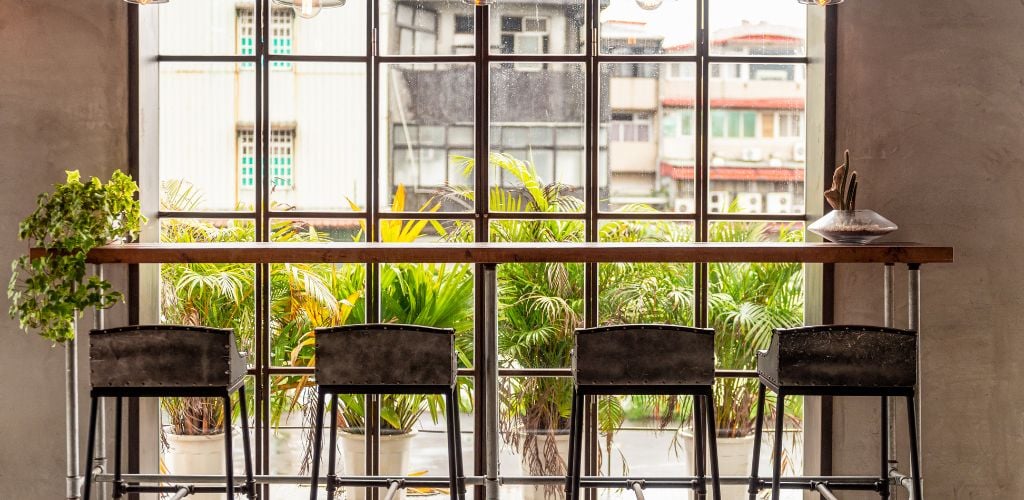
This was my local cafe during my time in Hoi An. Bonte is a great coffee stop but also has an excellent airconditioned coworking space on the 3rd floor.
The open-plan room has numerous spacious desks and office chairs, and good WiFi that’s well above the Mbps average for Vietnam. Bonte offers a sweet release from the heat during those hot Hoi An days and only costs around $1.50 to access!
3. Coworking Villa
Coworking Villa, conveniently located near Old Town Hoi An, offers modern amenities and extra perks for a comfortable workday. Customers enjoy complimentary breakfast on weekdays, daily printing allowance, free tea, coffee, water, and high-speed WiFi.
A day pass can be booked online for $14, but again if you’re staying in Hoi An for a length of time consider signing up for the month. With daily usage, it brings the price down to under $5/day.
Best Cafes to Work From in Hoi An

If it’s a more casual setting you are after for a remote work spot, Hoi An’s extensive cafe culture has got you covered. Here are a few of my favorite cafes to set up camp.
- Sound of Silence Cafe: With the beach on one side and a calm tranquil garden on the other there is a lot to love about this cafe. Solid Wifi, great coffee, and food options, but oh that view!
- Hoi An Roastery Espresso & Coffee House: An adorable cafe in the heart of Old Town. A cozy setting with additional patio seating that is full of old-world charm whilst offering free WiFi and a lively atmosphere.
- Rivia Coffee: A beautiful spot on the banks of the Bon River. Watch the boats coming and going while enjoying a great selection of food and drink choices. Welcoming digital nomads, many spend all day here at this great location.
Activities and Things To Do in Hoi An
We didn’t become digital nomads to just work all day right? The chance to explore and enjoy the wonderful surroundings and experiences of some faraway places is all part of the deal, and here are a few of my top picks for Hoi An.
1. An Bang Beach

Hoi An has an amazing stretch of coastline and some great beaches. An Bang Beach is easy to access from wherever you may be staying in the city and has a host of bars, cafes, and restaurants to keep you occupied when not sunbathing or swimming in crystal-clear waters.
Most of the bars along the beach offer free sunbeds, towels, WiFi, showers, and an all-day food and drink service. It’s a great way to revitalize after a busy week.
2. The Golden Bridge / Ba Na Hills
A trip to the famous Golden Hands Bridge in Da Nang is easy from Hoi An. The iconic structure is a must-visit location for breathtaking photo opportunities followed by a day of fun at Ba Na Hills Sunworld.
Full-day trips including an epic ride on world record-breaking cable cars are available with pick-up and drop-off from Hoi An. Click here for more information and to book your tour.
3. My Son Sanctuary Sunset River Cruise and BBQ
Combining a few of my favorite things – boat trips, history, and BBQ – there’s an excellent river cruise from Hoi An that visits the My Son Sanctuary. The cluster of partially ruined Shaiva Hindu temples dates back to the 4th century and offer a stunning glimpse back in time.
It’s a half-day tour that’s perfect for catching the sunset whilst on the water. Some delicious food is also served on the ride home. It’s a great way to spend an evening so click here to book your tour.
4. Explore Old Town Hoi Ann
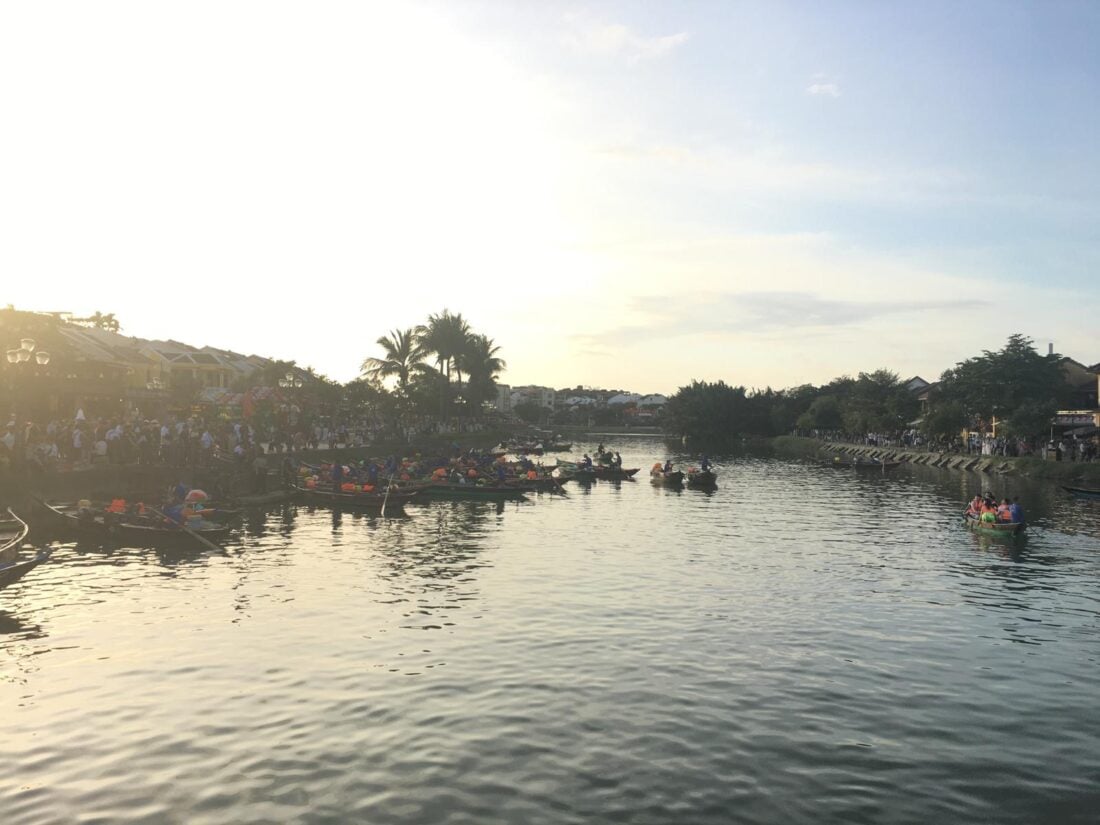
Wander the beautiful narrow streets of Old Town Hoi Ann taking in the sights, sounds, and aromas of the ancient town. The UNESCO World Heritage Site is a remarkably well-maintained trading port that dates back to the 15th Century.
There’s much to see including the Covered Japanese Bridge and the stunning Cantonese Assembly Hall. I highly recommend taking a short guided tour to ensure you see it all and get all the information about this amazing place. Check out this great 2-hour walking tour.
5. Visit the Night Market
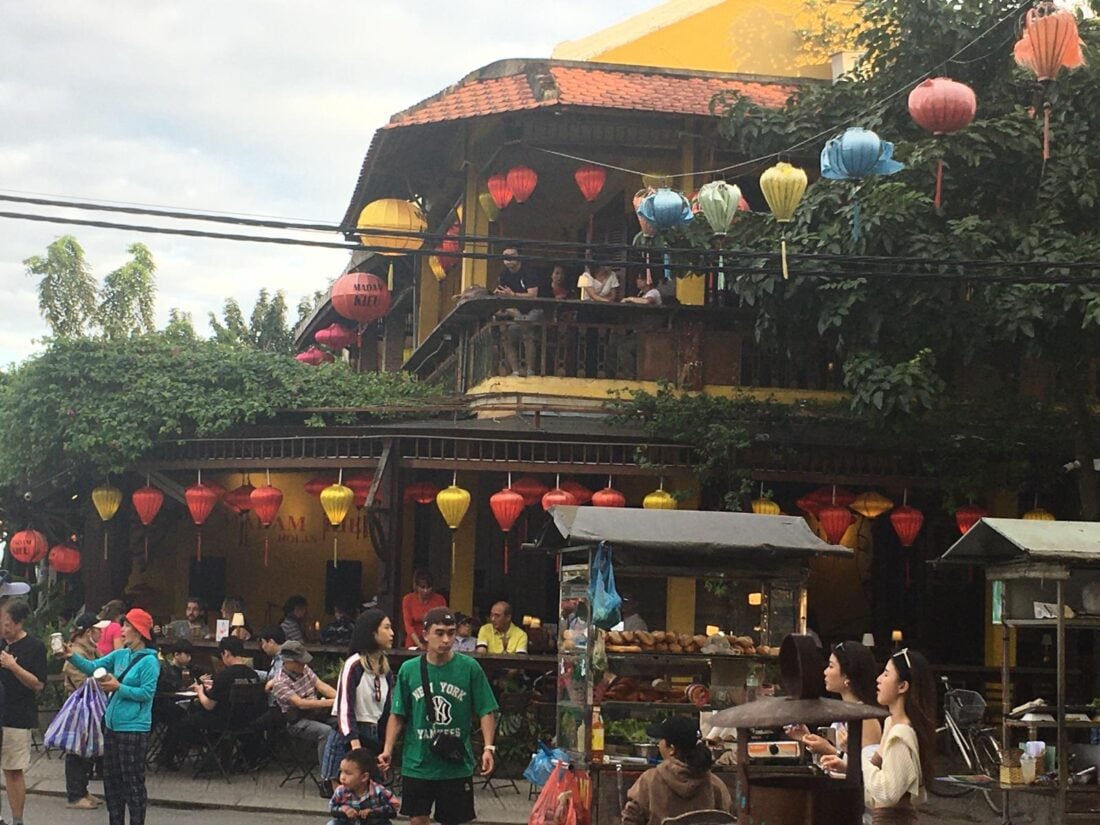
The Hoi Ann Night Market is a spectacle to behold. Every evening at 6 pm, just across the An Hoi Bridge, carts and stalls line the streets selling everything from squid on a stick and crepes to brand new clothing and jewelry.
It’s always a bustling environment as hoards of tourists and locals descend on the narrow market streets. I loved snacking at the different food stalls along the way, picking whatever looked good. Don’t be afraid to haggle here – the Vietnamese famously like a negotiation!
Weather in Hoi An

Hoi An enjoys a tropical climate characterized by two distinct seasons: the dry season and the rainy season. I was lucky enough to visit at the beginning of the dry season which spans from February to May. Every day brought warm temperatures, clear skies, and low humidity.
From September to January, the rainy season kicks in, with frequent rainfall and occasional typhoons, especially in October and November. Despite the rain, visiting during this time can still offer good weather, with cooler temperatures, and a chance to experience the city without the crowds.
Overall, Hoi An’s weather is generally warm and humid year-round, with average temperatures ranging from 21°C (71°F) to 29°C (85°F). Fantastic if, like me, you’re not a fan of the cold.
Pros and Cons of Living in Hoi An

There are of course always pros and cons of living anywhere. Here are a few of my top highlights and disadvantages for digital nomads to consider.
Pros of Living in Hoi An
- Beautiful surroundings: A digital nomad living in Hoi An will get to experience an ancient culture, lush green countryside, and a stunning beach all in one small city.
- Affordable cost of living: Compared to major cities in Vietnam and other countries, the cost of living in Hoi An is very affordable, with reasonably priced housing, food, and services.
- Plenty of ex-pats and fellow digital nomads: The abundant tourism trade and idyllic setting make Hoi An a great place to connect with fellow nationals of your own country as well as tourists and digital nomads from around the world.
- Good WiFi: Hoi An has a couple of excellent coworking spaces for remote workers but reliable WiFi is available pretty much everywhere.
- Further travel: Situated centrally within Vietnam, Hoi An is a great base for further exploration. Da Nang International Airport is around 40 minutes away with regular flights connecting Hoi An with all of Vietnam and the rest of the world.
Cons of Living in Hoi An
- Seasonal weather: Hoi An experiences both a dry season and a rainy season, with hot and humid weather during the dry season and heavy rainfall and occasional typhoons during the rainy season.
- Tourist crowds: A popular tourist destination, Hoi An experiences a lot of visitors annually. This can lead to overcrowded streets, traffic congestion, and higher prices/limited availability for goods, tours, and services.
- Language barrier: While English is pretty widely spoken in tourist areas, there will be a language barrier for any Hoi An digital nomads who do not speak Vietnamese and plan to base themselves in the city on a long-term basis.
- Cultural differences: Certain customs may take some getting used to for visitors. Eating with chopsticks, erratic and often chaotic driving situations, and a lower concern for personal space are all scenarios I have encountered.
Digital Nomad Visa for Hoi An

Vietnam, and as such Hoi An, doesn’t currently have a specific digital nomad visa. The conditions of entry and permitted length of stay vary depending on where you’re from.
For example, as a UK citizen, I don’t require a visa to visit Vietnam for up to 45 days and can apply online before arrival or at certain entry points for up to a 90-day stay. This is the same for 12 other countries.
Citizens of the USA and Canada must attain a tourist visa which can be completed online or at international points of entry. Visas can vary from 1-3 months and cost between $25 and $50 depending on the length of stay and number of entries you intend to make.
In Conclusion
I hope this digital nomad guide to Hoi An has provided plenty of exciting food for thought. It was a great experience working remotely from such a cool city and getting to see not only the touristy side but the true Hoi An was pretty special.
I highly encourage you to consider Hoi An as your next coworking location. You won’t be disappointed.
The post Digital Nomad Guide to Living in Hoi An appeared first on Goats On The Road.






Recent Comments